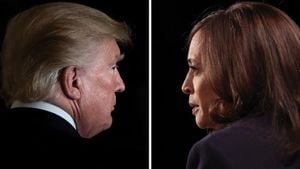President-elect Donald Trump is making headlines with his controversial choices for key public health appointments. Tapping prominent figures with polarizing views, including Robert F. Kennedy Jr. and surgeon Martin Makary, Trump aims to redefine the United States's approach to health and wellness. This new strategy echoes the sentiment of Trump's "Make America Healthy Again" campaign, which advocates for reforming the food industry and improving overall public health.
Among the most significant of these nominations is Martin Makary, who has been selected to serve as the next commissioner of the Food and Drug Administration (FDA). A prominent figure and pancreatic surgeon at Johns Hopkins, Makary made headlines during the COVID-19 pandemic for his outspoken views challenging conventional public health measures. He became widely recognized for developing "The Surgery Checklist," which aimed to reduce surgical errors by standardizing operations.
Trump announced the FDA appointment through his social media platform, Truth Social, asserting Makary's role would involve addressing "harmful" chemicals and pharmaceuticals linked to increasing rates of childhood chronic illnesses. He stated, "We are creating the Gold Standard of Scientific Research at the FDA. No longer will our agency be bogged down by bureaucratic red tape." This commitment to reform signals Trump's intention to invigorate the FDA's mission, steering it away from perceived inefficiency.
Alongside Makary, Robert F. Kennedy Jr. was selected for the role of Secretary of Health and Human Services (HHS). Kennedy, also known for his controversial views on vaccines and environmental issues, has criticized the FDA for overregulating advancements in health care and has called for revisiting standards related to food safety and pharmaceutical approvals.
Kennedy's previous stance against vaccines and his questioning of their safety, particularly during the heightened COVID-19 pandemic, has earned him extensive criticism but also support from like-minded advocates. He has positioned himself against "Big Pharma's" influence over public health, claiming such entities suppress natural remedies and advancements beneficial to public health.
According to Trump, the new leadership under Makary and Kennedy will focus on evaluating the safety of chemicals found within food supplies and addressing the epidemic of childhood chronic diseases. This emphasis on transparency is likely aimed at restoring public confidence after years of debate over health regulations.
Trump's appointments are not without their challenges. Makary has been part of contentious discussions surrounding the COVID-19 response, where he has supported masking and vaccination but also dismissed mandatory vaccine policies. He has claimed the risk of vaccine-induced myocarditis—a rare heart condition—was significant, a stance met with backlash from parts of the medical community, especially as multiple studies have shown low incidence rates.
Both Makary and Kennedy's public health philosophies revolve around skepticism of established health policies and the potential for corruption within government health agencies. During his tenure, Kennedy has been outspoken about advocating for reduced government oversight and increased access to unregulated health options. He has been vocal against certain vaccines, claiming they may pose hidden risks to children.
While Kennedy has vowed not to force any vaccination policies, some Republican senators have voiced concerns about his views. This could pose hurdles during his confirmation process, where he stands to lose approximately four votes if all Democrats oppose his nomination. Key figures like Senator Mike Rounds have already indicated they would need satisfactory explanations about Kennedy’s less conventional views on vaccine safety before extending their support.
The duo's approach is expected to resonate well with Trump's base, who largely view the current health system as overly restrictive and beholden to pharmaceutical companies. By placing individuals known for their controversial stances in these significant health roles, Trump seeks to connect with voters who desire reform.
Health experts express concern about this shift, warning it may endanger public health efforts. Critics argue the FDA under Makary may lean toward deregulation, potentially prioritizing expedited product approvals and alterations to long-standing safety protocols. The outcome of this new approach could redefine how the FDA interacts with the pharmaceutical and health food industries.
Trump's commitment to these public health changes arrives alongside rising concerns over the impact of chronic illnesses among children and growing skepticism about vaccine effectiveness. Proponents of the new appointments laud them as necessary for facilitating change. They believe these leaders will take the necessary steps to empower families to seek alternative health solutions and encourage natural remedies.
Another aspect of Trump’s strategy involves addressing claims about government mishandling of information during the pandemic. Makary's connections with the Trump administration offer him enhanced visibility as he aims to pivot FDA guidelines toward transparency, particularly concerning vaccine safety and efficacy data. This could pave the way for future reviews of existing protocols and regulations, particularly those perceived as burdensome.
The backdrop for these decisions includes heightened public scrutiny over healthcare policies, fueled by the pandemic's impact. Issues such as vaccine mandates and lockdown protocols have reignited debates over personal freedoms and governmental authority. By positioning Makary and Kennedy at the helm of public health agencies, Trump aims to promote their agenda, hoping to reduce government interference and restore faith among constituents.
Kennedy’s previous anti-vaccine rhetoric and campaign promises raise important questions about how significant reform will be realized at the federal level, particularly as both he and Makary must navigate the complex relationship between established science and political ideology.
Importantly, much hinges on the Senate's reception to these appointments. Should both individuals be confirmed, they could drive significant changes within the FDA and HHS, increasingly shaping U.S. healthcare policy and reflecting the goals of Trump's new administration.
The potential impact of their leadership remains uncertain, but it echoes the broader conversations around public health authority, regulatory systems, and the intersection of medical practice with individual rights. These discussions are likely to resonate well beyond the corridors of political power, affecting families and healthcare professionals alike as the nation seeks clarity amid changing paradigms.



